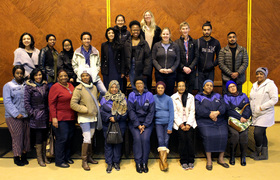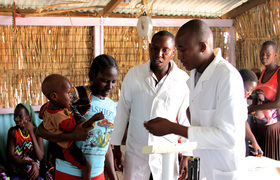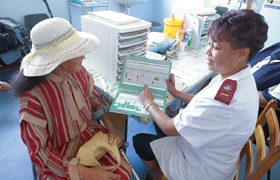Acclaim for UCT’s healthcare ‘bible’
30 October 2018 | Story Susan Segar. Photos Je’nine May. Read time 8 min.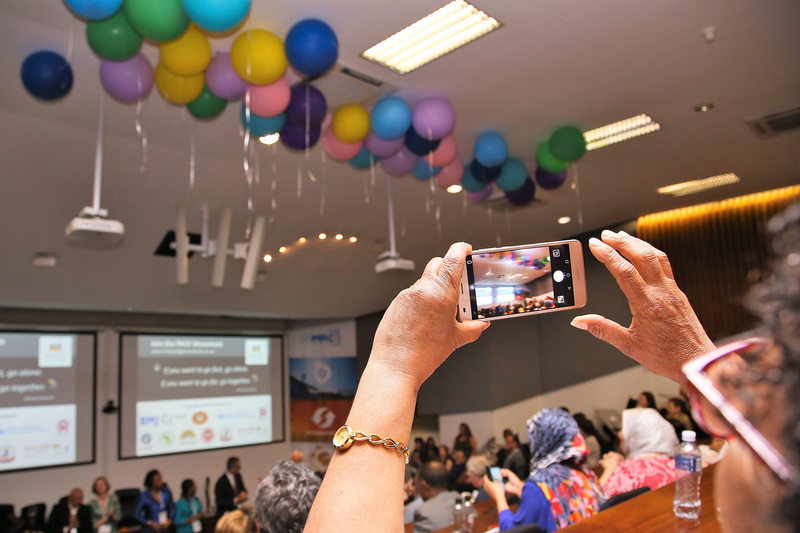
The conference centre at the SA Medical Research Council (MRC) erupted into cheers and applause on 26 October as colourful balloons were released into the hall to celebrate the official launch of the Practical Approach to Care Kit (PACK).
PACK is a programme which has been developed over the past 18 years by the Knowledge Translation Unit (KTU) at the University of Cape Town (UCT) Lung Institute, with the aim of empowering and equipping primary care health workers to manage a range of common adult conditions. These include communicable and non-communicable diseases, and acute and chronic conditions.
Also launched, to great applause, was a collection of PACK articles – written to describe the PACK programme – which are being published in the British Medical Journal (BMJ) Global Health open-access online journal.
The launches took place at the Alma Ata and PACK Congress which was held in Cape Town last week to mark the 40th anniversary of the World Health Organisation’s Declaration of Alma Ata. This 1978 declaration called for a recommitment and a strengthening of primary healthcare with a view to achieving universal health coverage for all people.
The PACK programme, which was a response to that declaration, is fast becoming known as a healthcare “bible” in clinics throughout South Africa. It has also been implemented in Nigeria, Ethiopia and Brazil, with much interest being shown by a range of other countries.
It assists doctors, nurses and other healthcare practitioners to diagnose and treat at least 40 common symptoms and 20 conditions, including cardiovascular disease, respiratory disease, tuberculosis, HIV and AIDs, as well as women’s health, end-of-life care and mental health – all in one “well-thumbed” handbook.
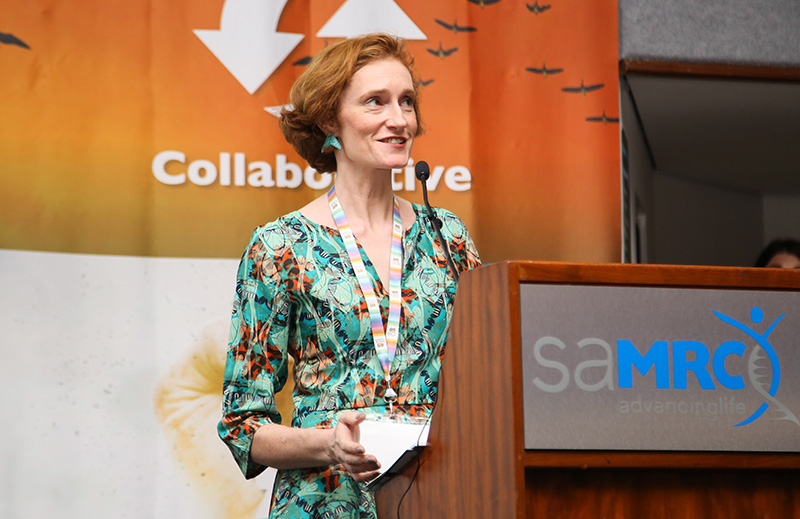
Universal health coverage
The congress, which was run by the KTU in partnership with the Western Cape Department of Health, the MRC and the BMJ, examined the progress achieved since the launch of the declaration 40 years ago.
Speaking during a session titled “Putting the Universal back into Universal Health Coverage: The contribution of PACK”, Department of Family Medicine Associate Professor Lara Fairall, who also heads the KTU, touched on the widespread interest in the PACK programme coming from around the world.
She also revisited the four pillars of PACK: a guide, a training strategy, a health systems strengthening intervention, and a monitoring and evaluation component.
“We don’t see whether you are a doctor, a nurse, a staff nurse … Our main consideration is what is asked of you in your daily practice.”
“Perhaps the most important metric of our performance is this picture of a nurse from a North West province clinic. During an unannounced visit, there on her desk, as with many desks across our country, was a copy of PACK which was open and being used,” said Fairall.
She explained that there are six ways in which PACK aims to “put the universal back into universal healthcare”. These include:
- Treating people, not programmes: “With multi-morbidity on the rise, many people present with a complex myriad conditions. There is an overlap of conditions. Solutions must be people centred.”
- Being cadre agnostic: “We don’t mind what pre-service training you have done. We don’t see whether you are a doctor, a nurse, a staff nurse … Our main consideration is what is asked of you in your daily practice. That is the driving force for how we drive our material.”
- Pooling their knowledge and work: “PACK is very much a partnership. We frequently learn far more from the countries which we partner with than what they learn from us.”
- Learning how to implement better: “For example, Nigeria took WhatsApp to a new level with a health WhatsApp group which helped greatly with communications.”
- Inspiring cross-country innovation.
- Gaining greater understanding of how PACK works: “Working together as a PACK community brings greater understanding of how it works.”
Fairall ended her address with an African proverb which the late Professor Bongani Mayosi, dean of the Faculty of Health Sciences at UCT, used often and which, she said, aptly describes what PACK wants to achieve.
Investment in health systems
“If you want to go fast, go alone. If you want to go far, go together.
“We have seen, over the last two days, that despite the Declaration of Alma Ata and despite huge investment in health systems, little in terms of systems has been accomplished and we have a long road to walk. So we must go together,” she said.
Dr Seye Abimbola, editor-in-chief of BMJ Global Health, said that the PACK Collection – a collection of papers about PACK’s experience over the past 18 years, including the implementation of PACK in the Western Cape where it began, and its development over the years – is an invaluable resource for the journal.
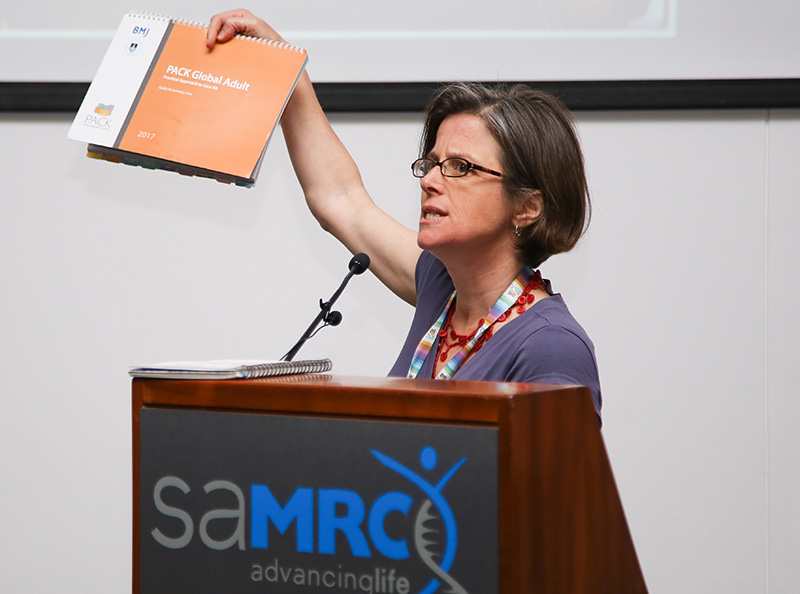
“There are 15 papers and growing. So far we have published five, but another 10 have been accepted and are still in production, and a few more are expected by the end of the year.
“Our journal aims to be a forum where rich descriptions of implementation can take place so that people can learn from the experience and learn from each other across settings. This collection showcases what has happened in practice.”
“We have seen, over the last two days, that despite the Declaration of Alma Ata and despite huge investment in health systems, little in terms of systems has been accomplished and we have a long road to walk.”
Abimbola said a lot of talk about primary healthcare is theoretical, but that this collection instead concentrates “the mind on how to achieve the goals of primary healthcare”.
Professor Martin Prince, director of the Global Health Institute at Kings College, London, congratulated all those involved in PACK for their “incredible achievements”. He also congratulated the editorial leaders of BMJ Global Health for “seeing a window in the journal for a collection of this kind, and for seeing the wider value it has”.
He hailed PACK for its comprehensiveness and for the fact that “everything is all there – in one guide”.
“I have been a growing enthusiast of PACK for the past five years. I am now going to be a champion for PACK,” he said, adding that for PACK to truly achieve its goals, a strengthening of the health systems of the countries implementing it is essential.
That way, Prince asserted, “the PACK programme can reach fertile ground”.
 This work is licensed under a Creative Commons Attribution-NoDerivatives 4.0 International License.
This work is licensed under a Creative Commons Attribution-NoDerivatives 4.0 International License.
Please view the republishing articles page for more information.







